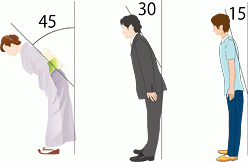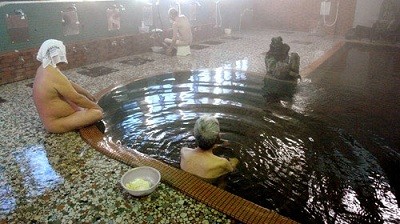Kapag bagong salta ka sa Japan o papunta pa lamang ng Japan, kailangan mong intindihan ang kultura at kaugalian ng mga Hapon, upang hindi mapahiya o mapahamak. Kapag alam mo itong mga kaugalian sa Japan, mas mapapalapit ka sa mga hapon, at ma-appreciate ang kultura ng Hapon.
1. Pagbati (Greeting) sa kapwa - Ang “bowing” (pag-yuko) ay isang simbolo ng paggalang sa kapwa na tinuturo sa mga hapon mula bata pa. Para sa mga foreigner o hindi hapon, kahit magpakita ka lang na bo-bow ka ng konti ay puwede na at ma-appreciate ito ng mga hapon. Tungkol naman sa pagtawag sa pangalan, para magpakita ng paggalang, magdugtong ng “-san” pagkatapos ng pangalan ng tao. Maaaring gamitin ang “-san” sa first name o last name ng pangalan. Halimbawa, kapag ang pangalan mo ay Juan Santos, pwede kang tawaging “Juan-san” o “Santos-san”. (Kapag mas kilala mo na ang tao, pwedeng “Juan-san” na ang tawag)

2. Salitang Hapon - Kung marunong ka mag-Japanese kahit kakaunti, mai-impress mo ang mga hapon. Kaya’t mas maganda na matuto ng kahit kakaunting salitang hapon. Narito ang mga importanteng salita na dapat matutunan: http://buhayofw.com/blogs/blogs-translation/pinaka-importanteng-salita-ng-hapon-para-sa-bagong-salta-70-basic-jap-52f1a19e11f89
3. Pagkain at Chopsticks - Matutong gumamit ng chopsticks bago pumunta ng Japan, na nakaugalian ng mga Hapon. Matutuwa sao mga hapon at ipupuri ka nila kapag sanay kang humawak. Isa pa, kadalasan ang mga pagkain ay kinakain gamit ang chopsticks at kutsara. Kapag nasarapan ka sa pagkain, sabihin mo: "oishii"(Ibig sabihin, masarap o delicious). Tandaan na huwag tutusok ang chopsticks sa kanin. Ito ay hindi maganda para sa mga hapon dahil parang nagaalay sa patay. Ganoon din sa ibang mga pagkain, huwag din ito gawin. Huwag rin mahiyang higupin ng maingay ang noodles o sabaw. Ang maingay na paghigop sa noodles ay nagpapahiwatig na nasasarapan ka sa pagkain. Pero wag mong dilaan ang dulo ng chopsticks, dahl pangit ito para sa mga hapon. Narito ang iilang mga pagkaing Hapn/ Japanese na dapat mong malaman: http://buhayofw.com/blogs/blogs-translation/ang-mga-pinakakilalang-pagkaing-haponjapanese-food-o-dishes--5237cd4447521
4. Public hot spring bath – Subukan ang public hot spring bath na napakasarap at paborito ng mga Hapon! Narito ang iilang kailangang tandaan: Naka-hubo’t hubad ka, ngunit hiwalay ang lalake sa babae (may bath sa babae, at may bath sa lalake). Bago ka papasok sa hot water, kailangan mong linisin muna ang sarili. Gayahin mo lang ang ginagawa ng mga hapon- umupo sa upuan at linisin ang sarili. Karaniwan may kasama ng sabon at shampoo. Masama ang tingin sa iyo ng iba kapag nahalata nilang marumi kang papasok ng hot bath…
Sento - neighborhood bathhouses,
Onsen - or hot springs.

5. Tattoo – Sa lipunan sa Japan, ang mga kriminal (criminal) lamang ang may tattoo. Kaya’t sa mga public bathtubs, bawal ang mga hapon na may tattoo. Kapag mayroong kang tattoo, pilitin mong wag ipakita kapag nasa Japan ka, dahil hindi maganda ang tingin ng mga Hapon sa mga may tattoo.
6. Japanese Rail Pass - Bumili ng Japanese Rail Pass. Makakatipid ka talaga, lalo na kapag lilibut at iikutin mo ang siyudad. Maaaring bilin ang Japanese Rail Pass online, habang nasa Pilipinas ka pa lamang.
7. Gamiting ang dalawang kamay sa pagbigay o pagtanggap - Kapag tatanggap ng gamit o regalo, gamitin ang dalawang kamay. Nagpapahiwatig ito ng paggalang. Ganoon din kapag magbibigay ng regalo o tarheta (calling card) sa Hapon.
8. Arigato (ありがとう) - Wag kalimutan ang salitang “Thank you” sa Hapon. Ito ay “Arigato” at ang pinaka-importanteng salita na dapat mong malaman.
9. Pag-ngiti/ Smile – Likas na mababait naman ang mga pinoy at palangiti, ngunit dapat parin tandaan na maging palangiti kapag nasa ibang bansa. Kadalasan, hindi gaano nagpapakita ang mga hapon ng galit o nagmumura, kaya’t dapat din gayahin ito ng mga pinoy na nasa Japan. Kahit na galit na galit ka, pilitin mong kumalma, dahil nasa ibang bansa ka at para sa mga hapon, kapag walang control ang isang tao sa sarili, hindi maganda ito sa tao.
10. No Tipping/ Walang Tip – Hindi nagti-tip sa Japan, maging sa taxi/cab, restaurant o mga parlor. Parang insulto pa nga sa tao kapag nag-tip ka, dahil kasama na sa presyo na binayad mo ang pinagawa mong serbisyo. Ngunit kapag nasa malaking siyudad ka tulad ng Tokyo, at nagiwan ka ng barya pang-tip sa restauran, iisipin ng waiter na kaysa mahirapan pa siyang i-explain sayo na walang tip, kukunin nalang nila ito.
Importante ang maintindihan itong mga kultura at kaugalian ng mga Hapon upang hindi mahirapan makisama at maayos ang paninirahan sa Japan.
News keeps us informed of what is taking place around us. It tells us of political events, extraordinary and the ordinary important events. Even the advertisements have their value. In the world today, reading the news is essential and necessary.
Reading the news give us deeper in sight into the event. With newspapers you can choose to spend a few minutes or a few hours reading repeatedly a piece of news, unlike television.
Reading motivates the drive to know what happens next, to want to turn the page, the need to keep going. So it forces us to learn new words, to think new thoughts. In addition, it also builds empathy.
Reading the news is like gaining insider access to current information about the world we live in today. It records events that happen. It is important and interesting to read about developments and progress that are being made from day to day in the affairs of your country or in the affairs to the world. Thus, reading a newspaper makes us fit to participate in our society. It also helps develop an educated mind, informed judgment, and critical understanding.
It has been said that to read is to fly and it is to soar to a point of vantage which gives a view over wide terrains of history, human variety, ideas, shared experience and the fruits of many inquiries. Reading is a particular exercise that not only gives an insight to the world around, but gives us an inner comfort. When we read a particular news, we start identifying ourselves with situations and those around us. By reading, we are actually viewing a reflection of our society. In the fast paced modern world of today, it has become very important to be updated. Newspaper is a great way of keeping ourselves updated. Newspapers remain the most invaluable source of news and information, despite the different forms of the electronic media.
Reading news also inadvertently improves one’s language skills. News items and articles are written to express and communicate, thus precision and meticulous use of words and expressions are used. As a result, a person will absorb these language and style details while going through news items and articles, as well as sharpen communication skills in reading and writing. Consequently, comprehension skills are enhanced. The more one reads, new words and expressions reveal their meaning to the reader’s mind. Unconsciously, our vocabulary is enhanced and the language ability improves, becoming more expressive and fluent.